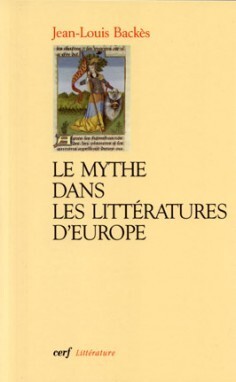- EAN13
- 9782204091718
- Éditeur
- Cerf
- Date de publication
- 11 mars 2010
- Collection
- Littérature
- Nombre de pages
- 206
- Dimensions
- 21,5 x 13,4 x 1,4 cm
- Poids
- 266 g
- Langue
- fre
Le Mythe Dans Les Littératures D'Europe
Jean-Louis Backes
Cerf
Prix public : 23,00 €
Quand on étudie la présence dans un texte littéraire de ce qu'on appelle " mythe ", à quel objet a-t-on réellement affaire ? Examiner cette question en détail fait surgir mille autres questions. Pourquoi la théorie renvoie-t-elle constamment à Homère et à Hésiode ? Dans quels textes de Platon rencontre-t-on le mot " mythe " ? Pourquoi les Pères de l'Église n'ont-ils pas banni la mythologie ? Quand le mot " allégorie " est-il apparu et à quoi a-t-il servi ? Pourquoi le mot " mythe " a-t-il disparu de l'Europe occidentale à la fin de l'Antiquité et pourquoi a-t-il reparu avec le romantisme ? Combien de sens a-t-il aujourd'hui ? (Il est impossible de répondre à cette dernière question, nous dit l'auteur, mais il est bon de savoir pourquoi c'est impossible !) On aura compris que Jean-Louis Backès mène une enquête serrée sur l'histoire du mot " mythe " et de ce qu'il a pu désigner. Pour ce faire, il passe en revue les textes fondamentaux anciens et modernes, analyse les formes que peut revêtir un récit mythique et interroge les différentes techniques anciennes et modernes d'interprétation. Il termine par une étude sur la présence, dans les littératures occidentales, des mythes liés à l'idée de chaos et de cosmos. Les exemples sont empruntés uniquement aux littératures des grandes langues européennes, de l'Antiquité à nos jours. Principalement parce que, en Europe, la mythologie antique est à la fois soigneusement conservée et vigoureusement combattue. La question du " mythe " et des idoles n'a toujours pas perdu de sa force et vaut donc la peine d'être posée. -- When we study the presence of what we call a 'myth' in a literary text, what are we actually dealing with? If we examine this question in detail, a thousand others arise. Why does theory constantly hark back to Homer and Hesiod? In which of Plato's texts do we encounter the word 'myth'? Why didn't the Church Fathers ban mythology? When did the word 'allegory' appear and what was its function? Why did the word 'myth' disappear from Western Europe at the end of Antiquity and why did it reappear with Romanticism? How many meanings does it have today? (It is impossible to answer this last question, the author informs us, but it is useful to know why!) By now it will be clear that Jean-Louis Backès' book is a concise investigation into the history of the word 'myth' and those things it might describe. To achieve this, he recalls the fundamental ancient and modern texts, analyses the forms that a mythological tale can assume and examines the different techniques of interpretation, ancient and modern. He concludes with a study of the presence in Western literature of those myths associated with the idea of chaos and cosmos. The examples are taken solely from the literature of the great European languages, from Antiquity to the present day. Principally because, in Europe, Antique mythology is both carefully conserved and vigorously attacked. The question of the 'myth' and idols, having lost none of its force, merits all our attention.


















